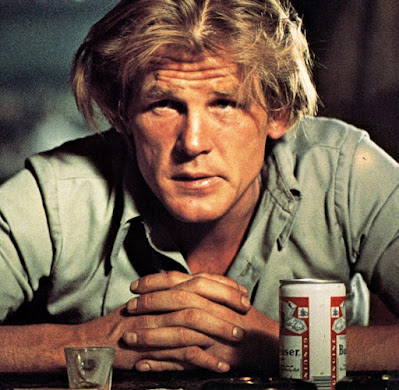Who'll Stop the Rain
What motivates John Converse? What drives him to concoct a plot to have heroin smuggled to the U.S. from Saigon? You would guess the money. Maybe the thrill. Maybe it's a perceived reward for having served as war correspondent, witnessing the senseless bloodbath of Vietnam. When he reaches the States, after the drugs have successfully been transported by his buddy, merchant marine Ray Hicks, things go seriously awry. Converse admits to his father-in-law that he "finally fucked up." What does that mean, exactly? Did he really expect a smooth passage? Has his life been without hindrance? Did John try to sabotage his own plan? Secretly hoping? Was he trying to feel something?
I found John's admittance to be the most curious moment from 1978's WHO'LL STOP THE RAIN. Maybe a bit baffling. As if I was missing something. I am not old enough to remember the late days of Vietnam, how those who fought returned to jeers and spittle, and were perhaps irrevocably damaged. Is Converse (Michael Moriraty) just ineffectual in the extreme? Numbed beyond sense? He is the opposite of Hicks (Nick Nolte), a primal, self sufficient bad ass who has found himself on the run with with John's wife Marge (Tuesday Weld) after a corrupt Federal agent and his goons attempt the intercept the stash. Converse will find himself at the mercy of Antheil (Anthony Zerbe), the rogue DEAer who uses brutish Danskin (Richard Masur) and oafish Smitty (Ray Sharkey) as muscle in his efforts to retrieve the junk.
The movie cuts between Hicks and Marge as they race through California, trying to escape and find another buyer, and Converse being tortured and then dragged on the chase by his captors. All will meet at a mountain hideaway (a literal and figurative bastion of '60s counterculture) in the desert for a final standoff. This makes WHO'LL STOP THE RAIN sound like an action film, which is accurate. Director Karel Reisz mounts a solid, rugged, yet highly contemplative odyssey. Robert Stone, adapting his novel Dog Soldiers, maintains the pursuit as a sort of clothesline upon which he hangs several themes. Moral decay. Burned out idealism. Patriotism for naught. Converse became a willing cynic, while Hicks, also cynical, still believes in some form of morality. Still has a sense of duty.
Nolte is very good as the weary but devoted soldier who is beaten down and still painfully self-aware. He's bitter, feeling as if he's been taken advantage of by "inferior people" for much of his adult life. Military personnel, L.A. drug dealers - they're equally scummy in his eyes, yet he may still need them to survive. Marge is a frail, drug addicted spouse who finds a strong bond of friendship (love?) with Hicks, someone who despite his jaded perspective still has the capacity to care and protect, perhaps much unlike John. The relationship between Ray and Marge is drawn believably and surprisingly unpredictably. One interesting but difficult scene - when Marge suffers withdrawal symptoms after running out of her narcotic, Ray makes her snort the heroin to get through the next few hours. There was a war in Vietnam, but also stateside, within ourselves.
P.S.: The film's title comes from the Credence Clearwater Revival tune, which along with "Hey Tonight" and "Proud Mary" is played repeatedly through WHO'LL STOP THE RAIN. The repetition works in some odd way....



Comments